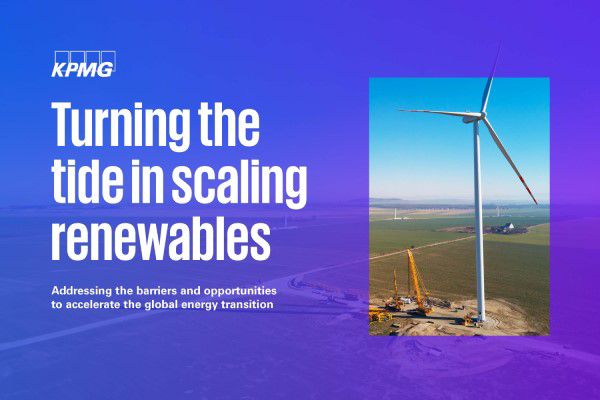The United Arab Emirates (UAE) has emerged as a trailblazer in renewable energy development, transitioning from its traditional dependence on oil and gas towards a more sustainable future. The nation’s efforts are aligned with the United Nations' Sustainable Development Goals (SDGs), showcasing its commitment to combatting climate change and fostering a green economy.
We explore the country's notable achievements as it works on adopting renewable energy sources, reducing carbon emissions, diversifying its energy mix and embracing cutting-edge technologies. The UAE's renewable energy journey is progressing well as it strives to realize its vision for a greener and more prosperous future.
Explore the barriers to scaling renewable energy
UAE initiatives
The UAE's commitment to renewable energy is exemplified by its strong policy and regulatory framework. The UAE Vision 20211 and the Abu Dhabi Economic Vision 20302 set ambitious targets to promote renewable energy adoption and energy efficiency. The government also established the UAE Energy Strategy 2050, aiming to triple the country’s contribution to renewable energy and achieve net zero by 2050.3 These strategies provided the necessary foundation for a thriving renewable energy sector and attracted local and international investors to participate in sustainable projects.
Shams 1 Concentrated Solar Power Plant
One of the UAE's landmark achievements in solar energy is the Shams 1 Concentrated Solar Power (CSP) Plant located in the western region of Abu Dhabi. With a capacity of 100 MW, it is one of the largest CSP plants globally and serves as a prime example of harnessing renewable energy in a desert environment.4
Mohammed bin Rashid Al Maktoum Solar Park
Dubai's Mohammed bin Rashid Al Maktoum Solar Park is another groundbreaking project that illustrates the UAE's commitment to solar energy. It is the world's largest single-site solar parks and aims to achieve a capacity of 5,000 MW by 2030 with a total investment of AED 50 billion. The park utilizes photovoltaic (PV) technology and implements advanced energy storage systems to ensure a stable power supply.5
The UAE’s National Hydrogen Strategy 20506 aims to support low-carbon local industries, contribute to achieving climate neutrality and enhance the UAE’s position as one of the largest producers of hydrogen by 2031, through the development of supply chains, the establishment of hydrogen oases and a dedicated national research and development centre for hydrogen technologies.
Its goal is to scale up local hydrogen production to:
- 1.4 million tons per annum (mtpa) by 2031 (consisting of 1 mtpa of green hydrogen and 0.4 mtpa of blue hydrogen)
- 7.5 mtpa by 2040, and
- 15 mtpa by 2050.
The UAE has also tapped into its coastal potential for wind energy generation. Several wind farms were launched under the UAE Wind Program,7 demonstrating the country's determination to diversify its renewable energy portfolio and embrace wind power. The project is spread across Sir Bani Yas, Delma and Al Sila islands in Abu Dhabi, as well as Al Halah in Fujairah and is expected to power more than 23,000 UAE homes a year and displace 120,000 tonnes of carbon dioxide.
In addition to solar and wind energy, the UAE has invested in nuclear power as part of its sustainability efforts. Abu Dhabi’s Barakah Nuclear Power Plant, inaugurated in 2020, is the first nuclear power station in the Arab world. It is expected to generate approximately 25% of the UAE’s electricity needs and significantly reduce the nation’s carbon emissions.8
To foster continuous advancements in renewable energy, the UAE has established research and innovation centers dedicated to sustainable technologies. The Masdar Institute of Science and Technology, now part of the Khalifa University of Science and Technology, has been instrumental in developing innovative solutions for clean energy and energy efficiency.9
The UAE actively collaborates with international organizations to share knowledge and best practices in renewable energy. It is a member of the International Renewable Energy Agency (IRENA) and actively participates in global initiatives to promote renewable energy adoption worldwide.10
The nation's steadfast commitment to renewable energy is gradually propelling the nation to the forefront of sustainable development. Through visionary policies, groundbreaking projects and significant investments, the UAE is diversifying its energy mix and paving the way for a greener future. As the UAE continues to spearhead innovation and international collaboration in renewable energy, it is setting a valuable example for other GCC nations seeking to transition towards sustainability.
Upcoming events
Join KPMG International at upcoming events related to the scaling of renewable energy.
5 December 2023: Turning the Tide in Scaling Renewables at COP28
Contact us
Connect with us
- Find office locations kpmg.findOfficeLocations
- kpmg.emailUs
- Social media @ KPMG kpmg.socialMedia
Stay up to date with what matters to you
Gain access to personalized content based on your interests by signing up today
- UAE Vision (vision2021.ae)
- Economic-vision-2030-full-versionEn.pdf (actvet.gov.ae)
- UAE Energy Strategy 2050 | The Official Portal of the UAE Government
- Masdar | Shams celebrates 10 years of powering change
- Dubai Electricity & Water Authority (DEWA) | Mohammed bin Rashid Al Maktoum Solar Park
- https://u.ae/en/about-the-uae/strategies-initiatives-and-awards/strategies-plans-and-visions/environment-and-energy/national-hydrogen-strategy
- Masdar | UAE Wind Program
- Barakah Nuclear Energy Plant (enec.gov.ae)
- Masdar Institute Celebrates Ten Years of Evolution and Growth with UAE - Khalifa University (ku.ac.ae)
- Scaling Up Renewables to Empower Lives and Livelihoods Requires an Integrated Effort (irena.org)


